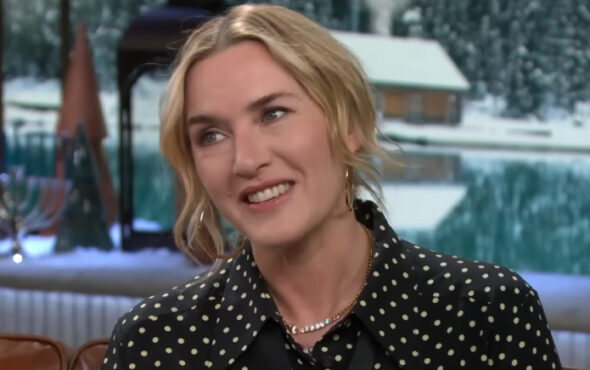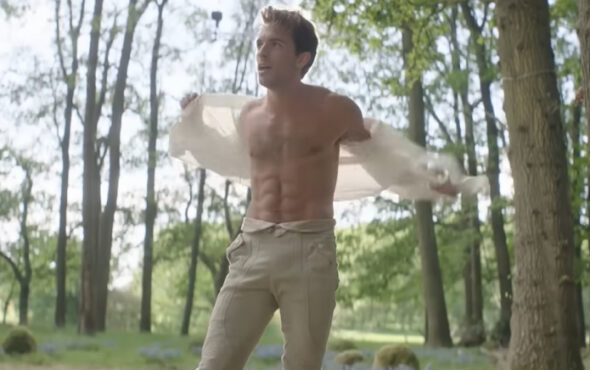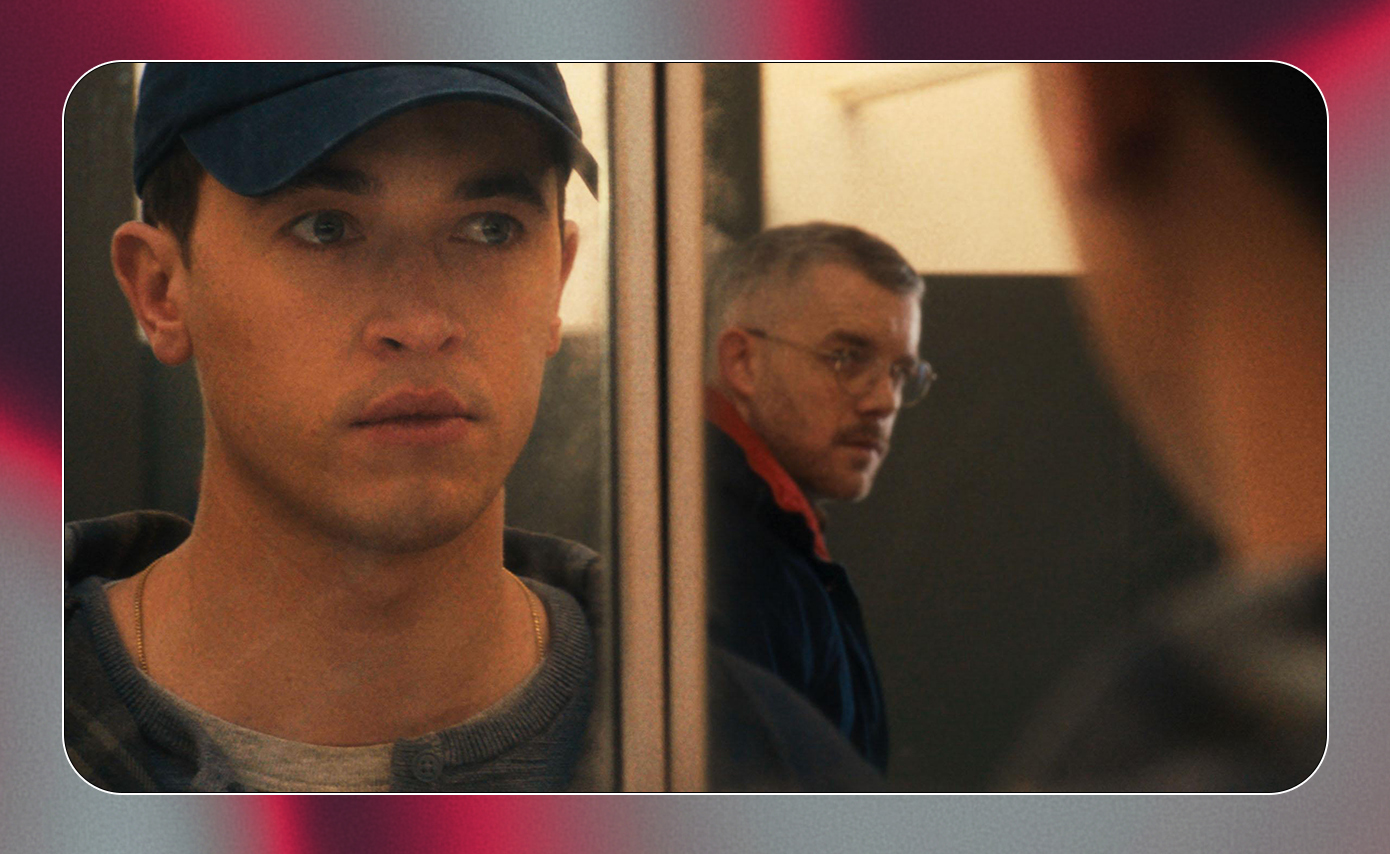
“This period in history is very resonant for our community,” Russell Tovey says of Plainclothes. While set in the 90s, the romantic thriller feels urgently relevant today: recent reports reveal that the Amtrak Police Department has targeted a Penn Station cruising site, resulting in more than 200 arrests since 1 June. “We thought this was a period piece when we made it,” Tovey continues. “It’s wild that we’ve actually made something that’s highly contemporary, even though it was thirty years ago.”
Tom Blyth leads Carmen Emmi’s searing and masterful debut feature as Lucas, a working-class undercover officer tasked with investigating and apprehending gay men in public spaces. As he carries out these operations, he wrestles with the moral weight of his role and the personal torment of betraying a community he secretly belongs to. The stakes intensify when he finds himself irresistibly drawn to his latest target, Andrew (Tovey).
“I felt I hadn’t seen it before, and that’s always the first port of call when you’re reading any script, ‘Have I seen this story told before in this way?’ And the answer throughout reading it was no,” Blyth tells Gay Times. “It was a story that felt necessary, but also deeply personal.”
Here, Russell Tovey and Tom Blyth reflect on the making of Plainclothes; from why its story resonated with them as actors, to their characters’ inner conflicts and the importance of visible queer storytelling in today’s political climate. Carmen Emmi also discusses why he felt compelled to explore the world of plainclothes officers for his debut feature, how Tovey and Blyth’s on-screen chemistry deepened the film’s unexpected romance and whether he’d ever consider revisiting these characters again.
GT: Carmen, it’s wild to me that Plainclothes is your debut. It is so, so brilliant. While we’ve seen films set in periods oppressive toward LGBTQIA+ people, few have tackled this particular subject: plainclothes officers targeting gay men. What drew you to this story, and why did you choose it for your first film?
Carmen: I got the idea a few years after I came out, and I read an article in The LA Times about a 2014 sting operation in Long Beach, California, where undercover police officers were luring men in a park bathroom and getting them to expose themselves. I started interviewing officers and men who were arrested, and I learned that there were some cases where officers would maybe get aroused on the job, and that was fascinating to me.
That, coupled with my coming-out experience, made me think it would be really interesting to explore this through the lens of a police officer who was struggling with their sexuality. My brother was becoming a police officer, so that all informed why I wanted to tell this story, or at least my entry point into it. I also wanted to revisit the nineties because that’s when I started suppressing my feelings, and where my anxiety kind of started. In a way, it was a therapeutic exercise to revisit that time in my life.
GT: Tom, Russell, it’s clear you were both drawn to the script, but what was it about this story and its specific era that resonated with you? And why do you feel it’s particularly urgent to tell this story today?
Tom: I felt I hadn’t seen it before, and that’s always the first port of call when you’re reading any script, ‘Have I seen this story told before in this way?’ And the answer throughout reading it was no. It was a story that felt necessary, but it also felt deeply personal. Before I even met Carmen I was like, ‘Whoever’s writing this is putting themselves completely into it.’ It felt really raw and vulnerable, as well as just being excellently written. Then I met Carmen and realised just how much of a pure artist he is, and how much he was bringing himself to the project and risking himself, which is always inspiring. It inspires you as an actor to risk yourself as well and put it all on the table.
Russell: This period in history is very resonant for our community. We’ve inherited the trauma of these sting operations going back to Oscar Wilde, John Gielgud or even George Michael. I found that a really fascinating concept. I also think this film vibrates with shame. As an actor, shame as a theme is an incredible thing to explore because it’s deeply nuanced and subtle, and everybody’s experience of shame is very unique. The nineties is kind of an intoxicating era because, myself being born in ’81, the nineties was when I was really coming into my own; working out who I was in the world, who my tribe was, where my community was, who I wanted to be. To go back to that period, but play it at the age I am now, was exciting. As Tom said, the script was just beautiful and we all loved it. Everybody working on the film just connected to the writing and the story deeply, and we all really committed ourselves one hundred per cent.

GT: One striking aspect of Plainclothes is how it blends multiple genres: thriller, drama, romance, paranoia and even comedy. Do you think a story like this could ever be confined to a single genre, or is its complexity essential to the narrative?
Russell: It’s sort of making its own genre up in a weird way, like a thriller romance. A rom-com thriller?
Tom: A rom-com? Where’s the com?
Russell: I say funny lines.
Carmen: A romantic thriller. I love the idea of a romantic mystery, though, and I didn’t expect this to be as romantic as it ended up being. It was something that was discovered on set with these two. I feel like it was revealing parts of myself that I didn’t know existed, I suppose. I didn’t realise I was that much of a romantic. I feel like, in coming-out stories, it’s kind of necessary for them to be a few different genres in one, just because the experience is so nuanced. It’s so many different things at once. It’s confusing, it’s scary, but it’s also romantic and beautiful.
GT: It’s interesting that the scenes I thought would have a saucy vibe actually felt quite romantic and heartfelt, and then vice versa.
Carmen: But I feel like that’s the queer experience in some ways.
GT: Carmen, what was it about Russell and Tom and their chemistry together that made you feel, ‘I’m onto a winner with these two’? Was there a particular moment that confirmed it for you?
Carmen: When they both popped up on the Zoom, you could just feel it. It was instant.
Russell: There was a chemistry test.
Carmen: They read the scene towards the end of the film, their last encounter. Tom and I were both really excited to work with Russell. We only had one conversation about it because Russell was always in the back of my mind when I was writing it. When I asked Tom I was like, ‘Who are you thinking for Andrew?’ and he was like, ‘Well, I’ve always wanted to work with Russell Tovey.’ They’re both just so open and generous as actors. I knew that about them individually, but then when they came together, it was just so beautiful. It was undeniable that, in person, it would really come to life.
Russell: It’s a strange concept when you describe an actor as generous, because what does that actually mean? The more I’ve worked with people like Tom, the more I realise that we make ourselves incredibly vulnerable. We take the emotions we go through in life, we transpose what we experience into these characters, and we allow ourselves to be vulnerable… to potentially screw ourselves up.
I don’t want to speak for Tom, but he has talked about this being quite an anxiety-inducing moment away from set. And that in itself is an act of generosity, in the sense that we give our psyche to the roles so that other people can connect, feel and see themselves on screen. It’s something I’ve heard for many years, this idea of generosity, and I never really understood it. But what Tom and I have done with this, to the best of our abilities, is just be open and vulnerable and honest. And that is a generous act.
Tom: I agree, yeah. Lucas is having such an anxiety-ridden time, he’s so paranoid and hiding himself with such tension, I was carrying that home with me a little bit, going to bed and not being able to sleep. I was thinking his thoughts and replaying moments in the day where I felt paranoid, and it was just kind of seeping into my nighttime existence. Because Carmen and Russell were so playful in the work, and so keen and curious to explore, being on set was actually the respite from that in a way. I was going through Lucas’s motions, but being on set was like a breath of fresh air. We were playing really openly and discovering as we went.
Russell: You put yourself through that, and that’s generous, to do that for Lucas.
Tom: But you can only do that when you’re surrounded by people who are doing it too, otherwise it’s a really isolating and lonely experience. I was doing it alongside you two, and alongside the rest of the cast, like Maria Dizzia. She’s so open and vulnerable, so you feel like you can take a risk because you feel emboldened by everyone around you.
Russell: This film feels like it’s worth putting yourself in that mindset, which is quite damaging, to some extent.
Tom: For a time.
Russell: Yeah, for a time. But there’s a kind of perverse privilege in having those feelings and using them to tell a story. And what’s more important than telling the story? Everybody on set was so committed to this script. Every moment, everybody from day one was just like, ‘Let’s give our best work here, guys.’
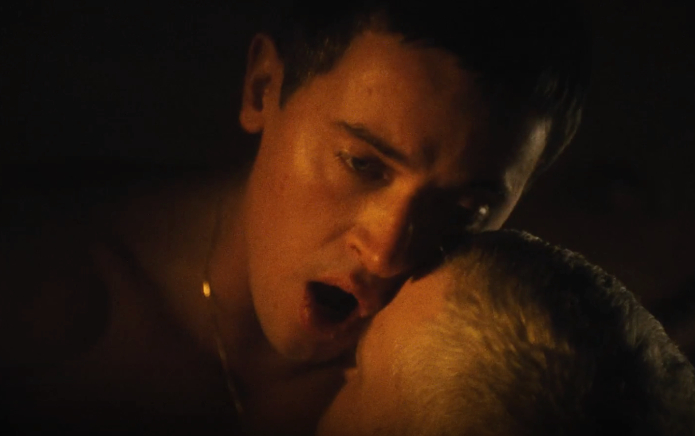
GT: It was absolutely worth it, Tom, because your performance is wonderful. Not that I’m happy you went through quite a bit of trauma…
Tom: I’m fine, by the way!
Russell: If you care about something as an actor and you’re instinctive, you damage yourself to tell the story. And that’s back to the generosity thing. I guess I’m using it a bit here, but…
Carmen: We were also coming off the strikes when we shot this. I don’t want to speak for the actor experience, but people weren’t working, so we were suppressing these feelings in a way. We were finally able to express them when we came to set, because we’d had to keep pushing because of the strikes. I think I had to wait a year and a half to actually start, and I was just ready to go. By the time we got there, I was like, ‘You know what? I just want to lead this with love. I want to create a space where we can just feel free,’ because there might be another strike. So we had to make it as good as we could in that moment.
GT: Tom, Lucas’ role is to entrap gay men, yet there’s a fascinating role reversal in how he becomes drawn to Andrew. How did you approach that dynamic?
Tom: Yeah. Is he entrapped? If anything, he’s entrapping himself by putting himself in a position where he’s literally having to persecute the people he sees himself in. But he hasn’t admitted it to anyone around him, and hasn’t even admitted it to himself. I think he’s in denial to himself as well. That’s why the scene with Amy, who plays my ex Emily, works so beautifully. You watch him, in real time, admit it to himself as much as he’s admitting it to her. Then she’s so supportive, when maybe you think she’s not going to be. That speaks to the hope that Carmen brings into it. Even though it’s a paranoia thriller, it’s anxiety-ridden, there’s also a lot of hope. So, I think he’s trapped, but the film ends on a note of hope, and his journey of discovery is a journey of hope. We don’t know where he goes, but we do know that his life is hopefully going to get a bit better because he can breathe for the first time, probably ever.
GT: I’m sorry, I have to ask because I’m so invested: where do you think Lucas is now?
Russell: The fact you asked that question is a testament to this film. So many people watch it and ask, ‘Where’s Lucas now? What’s Andrew up to? Do they get to where they want to go? Do they meet up again?’ That’s a testament to Carmen’s writing and direction, to all the work we put in, that an audience cares so deeply about these characters. There’s this radical kindness that runs through the film. Lucas has trapped himself, and he’s probably being the worst version of himself to himself. But his girlfriend Emily is just so beautifully kind. And his boss, the guy doing the entrapment with him, cares about him, respects him, loves him. My character, Andrew, comes in, and he could have been horrific as a first-time experience. But he’s adamant about being clear-spoken, about having safe sex — and all of these elements around Lucas mean that the hopefulness at the end is that he’s able to exist in the world knowing he’s been surrounded by love the whole time.
Tom: It’s almost like the people around him love him more than he can love himself.
Russell: That’s the queer experience.
Tom: Yeah, I think it’s captured so well.
Russell: Not for everyone, but for most people. The voices in your head are so much louder than the reality. When you go, ‘Oh, I’m gay,’ everyone else just goes, ‘Alright, chill out.’
Tom: And I think that’s Lucas’s experience in the film. He’s so deafened and blinded by the what-ifs, ‘How are people going to react? Is my mom still going to love me? Am I still going to be accepted by the men in my life who’ve defined what masculinity is supposed to look like? How am I supposed to perform masculinity if I don’t live up to that? Am I still going to be part of this family, part of this world?’ The film is mostly about him learning to love himself, and he can do that once the truth comes out. He’s faced with that realisation of, ‘Oh, maybe it all starts with me loving myself first, before I have to worry about whether other people love me.’ I mean, that’s such a cliché line.
Russell: A RuPaul line.
Tom: Yeah, ‘You’ve got to love yourself before you can love someone else.’

GT: Russell, you mentioned how hard it is to leave characters behind, and that’s certainly true with Plainclothes. Having watched it twice, I find myself wondering: where do these characters end up in 2025? Are they married? What’s their favourite LGBTQIA+ film? What do their Grindr profiles say?
Russell: They all love Plainclothes.
Carmen: They’re all in a theatre right now watching Plainclothes. I’ve been thinking a lot about where they are. I think I’m living it in some ways, and I was talking to Russell about it. It would be really interesting later on to maybe revisit the characters, maybe in the form of a play or something, after I’ve had a few more years to live. But I feel like Lucas definitely embraces his sexuality and lives freely. I like to think so, because I did, and he’s so much of me.
Russell: He’s everything Andrew denies himself and can never be. Lucas can be, and that’s the tragedy and the beauty of this piece.
Tom: Lucas also has his family as well. It’s toxic, the environment they’re in. There’s a lot of love, but not a lot of truth there. The way Paul talks to everyone is disrespectful, and the way his mom takes it on the chin and keeps a brave face… it’s not honest. Lucas’ moment of bravery, being honest with himself and everyone else, provides a space for him to breathe. I also get the sense he provides a space for his mom to finally be able to breathe, and say to Uncle Paul, ‘Don’t bother coming around here anymore. If you can’t treat people with respect, and if you can’t accept Lucas, then we can’t accept you.’ It’s an act of radical truth that he does for himself. But truth begets truth, in the same way lies beget lies. He cracks open some honesty, and I like to think it would have a ripple effect.
Russell: He’s a catalyst.
Tom: Yeah, the Brennan family probably all finally get to breathe and go, ‘Oh my God, we’ve all been holding our breath a bit, in different ways, in how we expect each other to act.’
Carmen: I wanted to explore how we all hide, and the secrets we all keep, even beyond the queer experience. Everyone has a secret, and every character in the movie is hiding something. I’m hoping that by the end, those truths can be revealed to themselves so they can live more freely.
GT: I love how the ending leaves certain elements open to interpretation, whether Lucas’ mother is happy, and that it’s Lucas, not his father, who receives Andrew’s letter.
Russell: Isn’t that wonderful? That one smirk… it carries about a thousand emotions. It’s like the Mona Lisa. But what is that look?
Carmen: I love that.
Russell: What is she thinking? For centuries, people have looked at the Mona Lisa and gone, ‘What is she… is she smelling a fart? What is she doing?’
Carmen: What is she doing?
Tom: I love that it’s in the gray area, that’s what life is. I love that the film ends not in the moment of acceptance from her, but in the moment she doesn’t look disappointed… or I don’t think she looks disappointed. If anything, I think she seems curious.
Russell: Yeah.
Tom: Do you know what I mean? There’s a curiosity that comes out of love. Without spoiling anything…
GT: I think we’ve already massively spoiled the film, go ahead.
Tom: We’ve already spoiled it, but watching that final note: is his mom leaning in, at the very least? She’s still leaning in because she loves him. I think she can now actually get to know him. I don’t think it’s going to be smooth sailing. I don’t think it’s going to be easy conversations, but I do think there’s a tinge of acceptance there at the very end. And it’s the beginning of probably a long road, but at least they’re on it.
GT: And *that* will be explored in the sequel.
Carmen: In the sequel, yeah.
GT: Colourfulclothes.
Carmen: Colourfulclothes: The Musical!
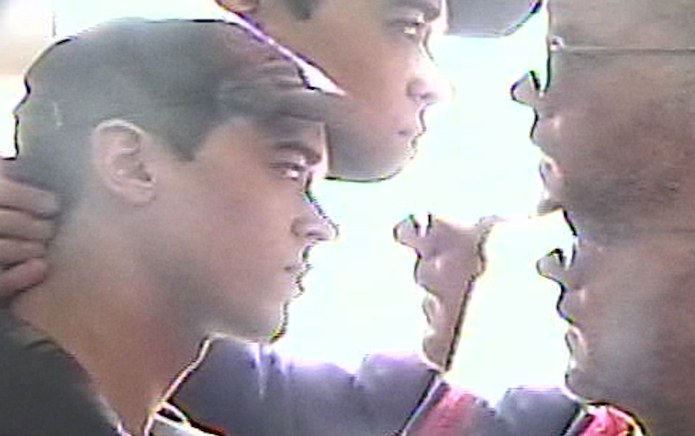
GT: Russell, you’ve portrayed a wide range of queer characters throughout your career. Some openly gay, like in Looking and Juice, and others more closeted, such as in American Horror Story: NYC and Plainclothes. As an actor, what is it like to navigate characters on such different points of that spectrum?
Russell: It’s a privilege. To tell all stories, whatever the sexuality, that’s a privilege. But to tell queer stories, especially in the current climate, I feel really proud of the work I’ve done and the breadth of queer characters I’ve been able to inhabit. The one that comes to mind, which is what Carmen actually saw, was Angels in America at London’s National Theatre. I played Joe Pitt, who was a man of the same period, actually probably five or six years earlier in the eighties. He was a religious man, married, turning homophobic, incredibly repressed, completely locked in. I was able to pull on my time with Joe Pitt, who I did “take home” like Tom took Lucas home, and pull him out and put him into Andrew at certain points, because there are so many elements of Andrew in there.
I just feel very proud that I can be visible, I guess. I’ve always taken on these roles because they excite me, and I feel like they’re important… they’re moving the dial forward. I love telling stories, especially queer stories. I want to make work that I wanted to see when I was a kid, that I needed and that was missing. So if I can keep telling those stories, and someone else can see them and go, ‘Oh, okay, that’s a possibility,’ then I’ve got to keep doing it.
GT: It’s interesting, Russell, that you also played a closeted man of the law in AHS. Did you share any insights or guidance from that experience with Tom as he prepared for this role?
Russell: Didn’t need to. Tom is phenomenal. He didn’t need any tips or hints from me about anything. Maybe in the back of the minivan, but other than that…
Tom: He told me I was doing great.
Russell: Yeah, he was very good at it for his first time.
GT: That leads me to my next question. In Plainclothes, intimacy feels integral to the story. While gratuitous sex scenes can be entertaining, every intimate moment here serves both the narrative and character development. How deliberate was your approach in building the sexual tension between Lucas and Andrew, so that it resonated not only between the characters but also with the audience?
Carmen: For me, the whole script was built around Lucas breathing. In the middle of the film, when he has his first sexual experience, there is this very intense breath that I feel can only really come from that sexual experience. For me, it was really important to explore sexuality in that way. In my experience, when you’re exploring your sexuality for the first time, you want to kind of let yourself go… but the anxiety, fear and shame just keep creeping in because of the environment in which you were raised. I feel like a lot of queer people have that experience. Even though it’s a very sexy scene, it shows that sometimes we can’t fully get there because our fear and shame get in the way.
GT: How important do you think it remains for films to continue depicting oppressive moments in LGBTQIA+ history, as Plainclothes does?
Carmen: It’s really important because even in the past week, there have been news reports about sting operations in Penn Station, for example, where 200 or so men have been arrested. As long as that keeps happening, it’s more important for stories like this to be told. I always get asked, ‘Are we done with the coming-out story?’ and I don’t think we ever will. There will always be people who feel like they have to hide. It’s going to be really important for them to see work like this so that they can feel free to be themselves.
Russell: We thought this was a period piece when we made it. And literally last week in New York, the stories came out through queer media, and hopefully it’s going to get picked up by mainstream media, about these entrapment sting operations being carried out in Penn Station. It’s wild that we’ve actually made something that’s highly contemporary, even though it was set 30 years ago. It’s insane, isn’t it?
Carmen: Yeah, wild.
GT: I’ve been at Gay Times for several years, and there were moments when it felt like we’d moved past having to ask, ‘How important is visibility?’ and so forth. We could discuss queer media much like we would mainstream cis-heterosexual media. Yet today, conversations about visibility feel more urgent than ever.
Russell: We have to be visible, and we have to tell queer stories more than ever. People go, ‘Another queer story?’ Yeah, another one, and here’s another one. Because when you do that, people start to go, ‘Oh, this is so normal.’ Can we just forget about this zeitgeist that says these people, this minority of people, are evil and causing everything that’s wrong in the world? Let’s just bombard them with queer narratives. It just becomes so passé.
Tom: In a dream world, you wouldn’t have to differentiate between cinema and queer cinema. In a dream world, it would just be cinema… but that’s not the world we live in.
Russell: That’s why you have to stay visible, keep telling these stories, support these stories and get behind them. As an audience – this is for the community, but also for the universality of this story – it hinges on these queer characters, but it’s massive, beautiful, hopeful, painful, chaotic, truthful and honest. We need it.
Tom: And to your point, I think it’s so important to tell a variety of stories. It’s not just stories that focus on the trauma of the queer experience or any marginalised community. If you’re telling a story about a certain community that has experienced a lot of trauma, or a disproportionate amount of trauma, it’s vital to balance that with stories about hope, love, and joy as well. That’s what I love about this film. Yes, it’s rooted in a traumatic experience of repression and oppression, but there’s so much hope threaded through it as well. It ends on a note of hope. There’s love in there, and there’s a lot of compassion. It’s not trauma porn at all. We all experience trauma in our lives, but when you tell the story with the undercurrent of, ‘Yes, but there’s hope at the end,’ people will watch it and come away feeling, ‘I feel seen. I feel like the trauma was acknowledged. But I also feel like there’s light at the end of the tunnel.’
Carmen: And there’s somewhere for it to go.
Tom: Yeah, it’s not the end of the story. It’s the beginning.
Plainclothes is out in the UK now.

